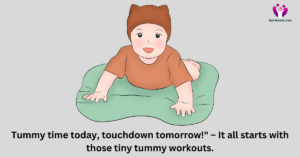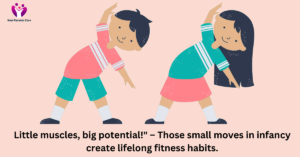Introduction
Kids physical activity is a cornerstone of healthy development. Engaging in regular exercise not only promotes physical health but also supports emotional, social, and cognitive growth. In this blog, we’ll explore the importance of physical fitness for various age groups and share fun, effective ways to encourage kids to stay active every day.
Importance of physical activity for children’s development
1) Infants and Toddlers (0-3 years)
During the earliest stages of life, movement is crucial for brain development and motor skills. Physical activity in infants and toddlers helps them develop strength, coordination, and balance.
- Encouragement of Movement: Provide plenty of tummy time for infants to strengthen their neck and shoulder muscles. As they grow, encourage crawling, standing, and walking by creating safe spaces for exploration.
- Interactive Play: Use toys that promote movement, such as balls, push toys, or soft climbing structures. Dancing to music can also be a fun way to engage little ones and help them develop their coordination.
2) Preschoolers (3-5 years)
Children brim with energy and curiosity during this period. Regular kids’ physical activity helps develop their motor skills, encourages social interaction, and fosters creativity.
- Structured Play: Engage preschoolers in structured activities like simple games or organized sports. Activities such as “Simon Says” or obstacle courses can be fun and physically beneficial.
- Imaginative Play: Allow children to engage in imaginative play that requires movement. Pretend play, like being animals or superheroes, encourages running, jumping, and climbing.
3) School-aged children (6-12 years)
As children enter school, physical fitness becomes even more vital. It helps with social skills, self-esteem, and the development of lifelong habits.
- Team Sports: Encourage participation in team sports like soccer, basketball, or swimming. These activities teach teamwork and discipline while providing a fun way to stay active.
- Family Activities: Make physical activity a family affair by going on bike rides, hikes, or nature walks. This not only fosters a healthy lifestyle but also strengthens family bonds.
4) Adolescents (13-18 years)
During adolescence, physical activity is essential for promoting physical and mental health. It aids in stress relief, boosts self-esteem, and helps with body image.
- Diverse Options: Encourage teens to explore various forms of physical activity. From martial arts to dance classes or outdoor adventures, finding an activity they enjoy can lead to lifelong fitness habits.
- Social Engagement: Encourage teens to join clubs or teams that interest them. This social aspect can make exercise more appealing and motivate them to stay active with friends.
Benefits of Physical Activity

Physical Health
Regular child exercises help reduce the risk of obesity, heart disease, and other chronic illnesses. It strengthens bones, improves cardiovascular fitness, and enhances overall physical endurance.
Mental Well-Being
Exercise releases endorphins, which can improve mood and reduce anxiety and depression. Kids’ Physical activity also promotes better sleep patterns and can enhance concentration and cognitive function.
Social Skills
Participating in group activities or team sports encourages teamwork, communication, and socialization. These experiences help children develop strong interpersonal skills that are essential throughout life.
Establishing a routine of physical activity from a young age sets the foundation for a healthy lifestyle. Children who are active during their formative years are more likely to carry those healthy habits into their adult lives.
How to engage physical activity in children

Make It a Game
Incorporate exercises for kids into playtime. Create games like tag, hide and seek, or scavenger hunts that require movement. Use creative themes to keep children engaged and excited about being active.
Use Technology Wisely
Utilize fitness apps or active video games that promote movement. Dance or workout challenges can be fun and interactive, allowing children to engage with friends while being active.
Set up an Active Home Environment
Transform your home into a space that encourages movement. Designate areas for active play, such as a small indoor obstacle course or a backyard play zone. Keeping sports equipment accessible can also inspire spontaneous play.
Lead by Example
Children are more inclined to be active when they observe their parents participating in physical activities. Make it a point to include family workouts, weekend hikes, or regular bike rides in your routine. Your enthusiasm can inspire them to join in.
Create a Routine
Establish a daily or weekly schedule that includes designated times for physical activity. Whether it’s a family walk after dinner or a Saturday sports day, consistency helps children understand the importance of being active.
Celebrate Achievements
Recognize and celebrate your child’s efforts and achievements in physical activity. Whether they master a new skill or simply try something new, positive reinforcement can boost their confidence and motivation.
Conclusion
Physical activity is vital for your child’s overall development and well-being. By encouraging movement through fun, engaging activities, you can help instill a love for physical fitness that lasts a lifetime. Remember, the goal is to create a positive and supportive environment that makes staying active a natural part of your child’s daily life. Embrace the journey together, and watch your children thrive physically, emotionally, and socially.
Join Our Parenting Community:
Need personalized recommendations for your child? Join our exclusive WhatsApp Group where you can get advice on topics like picky eating, sleep routines, and more, directly from experts and fellow parents! You’ll also be the first to know about new tips, tools, and articles.
Explore Our Handy Tools:
We’ve got a bunch of free tools to make parenting easier! Check them out:
- Baby Name Generator: Find the perfect name for your little one.
- Ovulation Calculator: Track your fertility and plan your pregnancy.
- Pregnancy Weight Gain Calculator: Monitor your pregnancy progress with ease.
- Chinese Gender Predictor: Curious about your baby’s gender? Have fun predicting!
Stay Connected with Us:
For more tips, parenting hacks, and fun ideas, follow us on:
Join the conversation and get daily inspiration for your parenting journey!
Stay connected and let us help you on your parenting journey!
